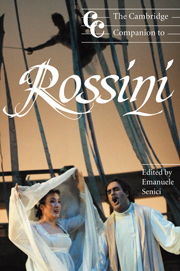Book contents
- Frontmatter
- 1 Introduction: Rossini's operatic operas
- Part I Biography and reception
- Part II Words and music
- 5 Librettos and librettists
- 6 Compositional methods
- 7 The dramaturgy of the operas
- 8 Melody and ornamentation
- 9 Off the stage
- Part III Representative operas
- Part IV Performance
- Notes
- List of works
- Bibliography
- Index
6 - Compositional methods
from Part II - Words and music
Published online by Cambridge University Press: 28 September 2011
- Frontmatter
- 1 Introduction: Rossini's operatic operas
- Part I Biography and reception
- Part II Words and music
- 5 Librettos and librettists
- 6 Compositional methods
- 7 The dramaturgy of the operas
- 8 Melody and ornamentation
- 9 Off the stage
- Part III Representative operas
- Part IV Performance
- Notes
- List of works
- Bibliography
- Index
Summary
The peculiar shape of Rossini's theatrical career encouraged the circulation of a host of anecdotes about his compositional methods. Their function was to provide a rationale for both the miracle of creativity that permitted the composer to write some forty operas in twenty years, many of them enduring achievements, and the psychological mystery that surrounded his withdrawal from the operatic stage after Guillaume Tell in 1829. These anecdotes tended to trivialize Rossini's works and to cast doubt on his seriousness as an artist. Some of them emphasise Rossini's habit of employing the same music in more than one opera, without making any effort to describe his practice more precisely. Others claim to enter into the workings of his creative spirit. A fabricated ‘letter’ tells us that the overtures to Le Comte Ory and Guillaume Tell were prepared while Rossini was fishing with his banker friend, Alexandre Aguado, ‘as he spoke to me about the Spanish economy’. Another favourite site for creative work was said to be a crowded room, amidst the hilarity of friends laughing, drinking and singing. According to another anecdotal tack, implicitly emphasising his sloth, Rossini was said to have composed in bed. When a sheet of music paper fell to the ground, the story continues, the indolent Rossini did not deign to go after it, but instead took another piece of paper and started again. I have always wondered why this anecdote is thought to emphasise Rossini's laziness, as opposed to his extraordinary creativity.
- Type
- Chapter
- Information
- The Cambridge Companion to Rossini , pp. 68 - 84Publisher: Cambridge University PressPrint publication year: 2004
- 1
- Cited by



